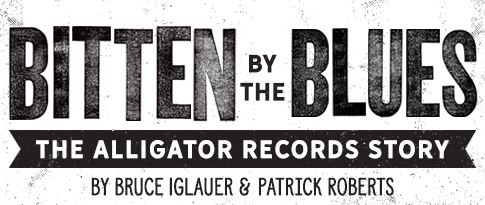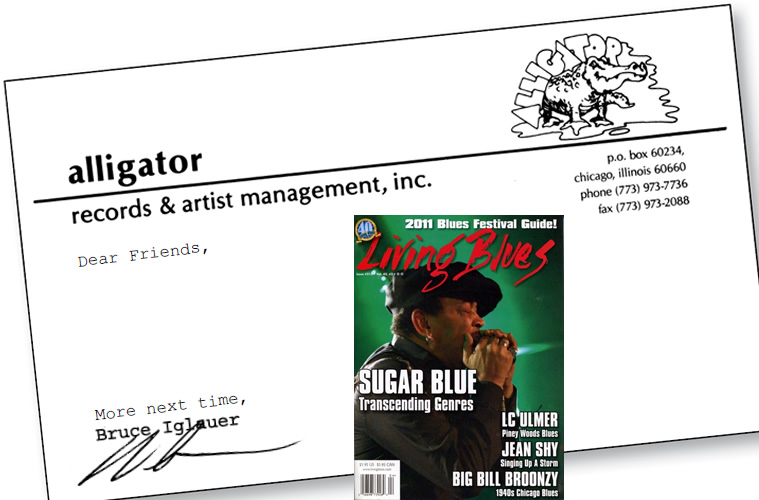Dear Friends,
We’re very excited about the initial reaction to The Alligator Records 40th Anniversary Collection. It debuted at #2 on the Billboard Blues Chart, sold more copies in the first week than any album we’ve released in some years, earned a four star review in Rolling Stone and lots of other media accolades. I’ve been invited to appear on National Public Radio’s Weekend Edition Saturday to talk about this two-disc set and the first forty years of Alligator (I’m planning for many more years, trust me).
We’ve just released a brand new masterpiece from the queen of Texas and Louisiana roadhouse music, Marcia Ball. Roadside Attractions is a terrific slice of what we love about Marcia — rollicking New Orleans rhythms, Texas blues shuffles, laid-back swamp pop, awe-inspiring piano, and that sweet, soaring, storytelling voice. But Marcia’s music is more than that. Over her 30-year career, more and more of the songs she performs have been her own original compositions, full of intelligent, subtle and beautifully crafted lyrics. With Roadside Attractions, Marcia has recorded her first album made up entirely of songs she has written or co-written. Eight of the twelve songs here are solely Marcia’s creations. For the other four she’s joined forces with three great writers—the legendary Dan Penn, composer of dozens of soul classics for artists like Aretha Franklin and Percy Sledge; producer/songwriter Gary Nicholson, who has written hits for everyone from Bonnie Raitt to his pal Delbert McClinton; and Tom Hambridge, whose songs have been cut by Buddy Guy and Susan Tedeschi, among many others. She’s running in some very fast company indeed. The result is perhaps her very best album ever. This is one seriously joyful record, straight from the soul of a woman who has learned over three decades how to move the bodies and spirits of her listeners. You can hear some samples on our juke box at www.alligator.com.
And now let’s turn the clock back to the signing of a band that went on to become one of Alligator’s most popular acts — Little Charlie & The Nightcats. It’s well known that I still listen to unsolicited material that’s sent to me (even if it sometimes takes months for me to find the time). In July of 1986 I was visiting my mother in Cincinnati and brought a batch of demo cassettes. Attached to one was a note from a harmonica player I had been introduced to many years before by Jerry Portnoy, the harpslinger who spent six years in the Muddy Waters Band. Jerry had raved about a harp playing friend from the Bay Area, and one day he brought Rick Estrin by the Jazz Record Mart (where I was a clerk) to meet me. I had never heard Rick play, but remembered his name, so I prioritized the cassette. I was immediately knocked out by how tight and swinging the band was, by the fat-toned and very confident harp work, and especially by the quality (and humor) of the songwriting. Tunes like Poor Tarzan, TV Crazy and Short Skirts seemed like instant classics to me. I jumped on the phone and introduced myself to the guitarist (who wasn’t much featured on the cassette), Charlie Baty aka Little Charlie, whom Rick had explained was the leader of the band. Charlie told me that they were on the verge of signing with another label, and I convinced him to wait until I saw them live. Within a few weeks, I was on the way to their home town of Sacramento to catch two nights of their show at a bar called Melarkey’s. I expected a harp-led quartet with Rick front and center, a lot of witty songwriting and some tight playing behind him — sort of like the original Fabulous Thunderbirds but with a sly sense of humor. Imagine my shock when I first heard Charlie Baty step out on guitar. He was obviously a monster player, capable of raw, 50’s-style Chicago blues, jumping, jazzy swing and stinging, Buddy Guy-influenced string bending. In one band I had found both a world-class guitarist and harp player, plus a composer of quirky, memorable slice-of-life lyrics and a solid rhythm section. On top of all of that was the live show, with Rick’s slick hipster stage persona (including the cool narrow mustache, pompadour and purple suits) and Charlie’s energized guitar work that left him grinning and soaked in sweat. These guys were just too good to be true, and had hardly played more than 100 miles from home. I made an offer to them there and then. I wanted these guys in the Alligator family. I knew I had found something special, but didn’t realize how special.
More next time,
Bruce Iglauer

